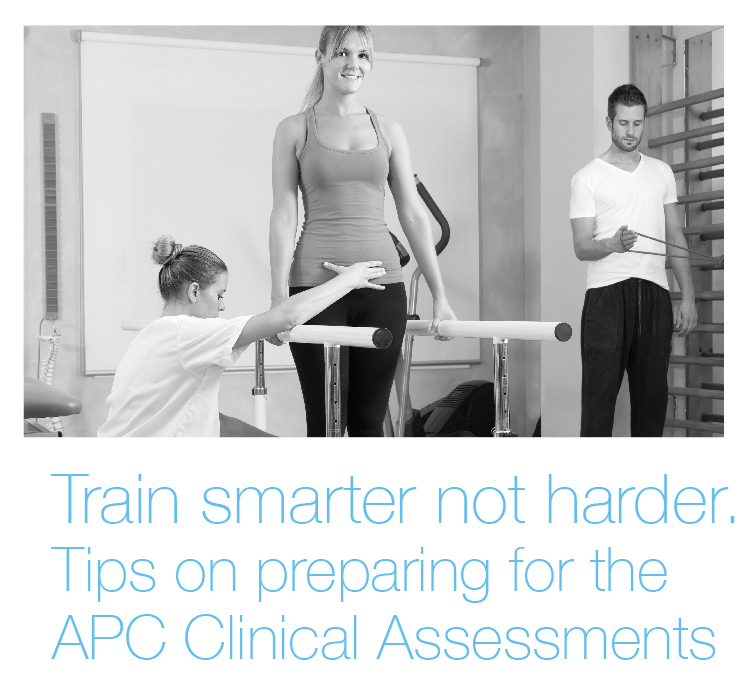Train smarter not harder: Tips on preparing for the APC Clinical Assessments
Train smarter not harder: Tips on preparing for the APC Clinical Assessments
By Sindy Rollins (BSc. Physiotherapy, PGDip. Neuromusculoskeletal Physiotherapy, MACP, AHPRA, HPC, APC Clinical Exams Preparation course educator)
Necessity as they say is the mother of all invention. Finding time to study alongside holding down a job(s), being a parent, dealing with the administration requirements for emigration or all of the above (plus being pregnant in my case), is always going to be tricky. For this reason you have to make sure your time is used both efficiently and effectively. One place to begin is by breaking down the sessions into the four main subjects (listed below). From there you can work on the gaps in your knowledge and how to go about filling them.
 The next APC Clinical Exams Preparation course will take place in Perth from Friday 15th April - Sunday 17th April at the University of Notre Dame in Perth, WA. The cost of the course is $1200. This fee includes the Learning Resource USB Stick. For more information about the course click here or book online now.
The next APC Clinical Exams Preparation course will take place in Perth from Friday 15th April - Sunday 17th April at the University of Notre Dame in Perth, WA. The cost of the course is $1200. This fee includes the Learning Resource USB Stick. For more information about the course click here or book online now.
- APC Clinical Assessment process
- Musculoskeletal skills
- Neurological skills
- Cardiorespiratory skills
- https://physiocouncil.com.au/
- Criteria being examined: APC clinical assessment form criteria.
- Method by which you will be assessed: Assessor training manual and Australian Physiotherapy Council decisions in the clinical assessment process.
- communication during a patient assessment-verbal, tactile, visual.
- clinical reasoning – explanations to patient and assessors. Initial 10 min patient handover.
- First step: find a good text from which to revise conditions, normal values, current outcome measures, etc. The physiotherapist’s pocket book, as an example, is a handy reference for each of the core clinical areas.
- Second step: check your clinical reasoning against case studies. Useful text – clinical case studies in physiotherapy.
- Third step: Observation. Organize observational placements in the core areas to help identify areas of manual handling, tactile facilitation and communication on which to work. Observe other peoples practice; this could be in the health care setting, in tutorial groups, webinars or courses. Consider how this practice might be appropriate or inappropriate to the APC assessment process.
- Effective communication
- Clear clinical reasoning
- Confident demeanor
- A clear Understanding of the APC clinical assessment process
 The next APC Clinical Exams Preparation course will take place in Perth from Friday 15th April - Sunday 17th April at the University of Notre Dame in Perth, WA. The cost of the course is $1200. This fee includes the Learning Resource USB Stick. For more information about the course click here or book online now.
The next APC Clinical Exams Preparation course will take place in Perth from Friday 15th April - Sunday 17th April at the University of Notre Dame in Perth, WA. The cost of the course is $1200. This fee includes the Learning Resource USB Stick. For more information about the course click here or book online now.
